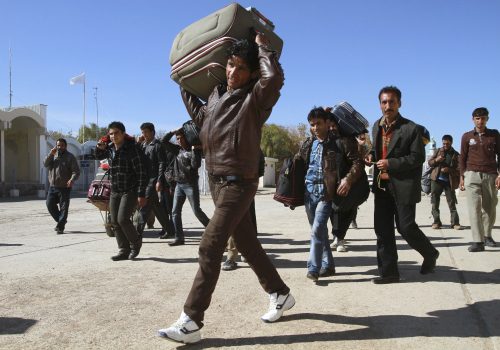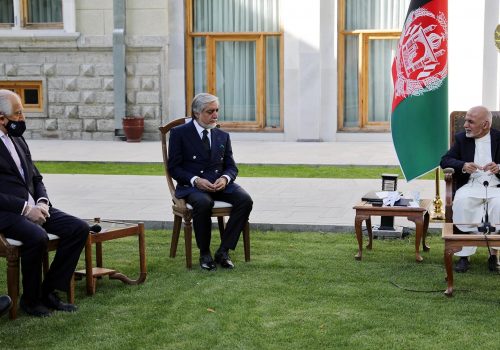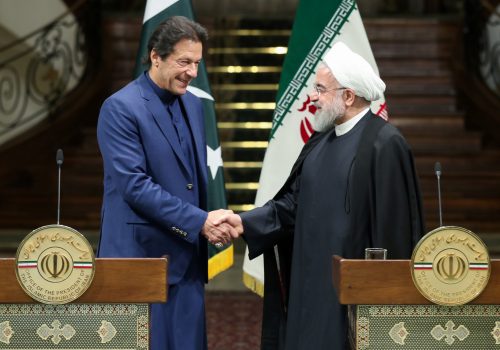A top Baluchi terrorist was killed—how will this impact insurgencies in Iran?
The headline is familiar: “Leader of the Insurgent Group Killed.” Also familiar is Iran’s reaction and position on regional insurgencies. Instead of implementing much-needed actions in easing discriminations, Tehran’s approach has been to expand its military presence in the deprived Sistan and Baluchistan province.
Top terrorist Omar Shahoozi—nom de guerre Mullah Omar Baluchi or Mullah Omar Irani—was killed along with his two sons in Turbat, Pakistan on November 17. Shahoozi was described by Fararou, a media outlet close to the Islamic Revolutionary Guards Corps (IRGC), as the leader of the Sunni extremist militant group Jaish-ul-Adl.
The Salafi group Jaish-ul-Adl (Army of Justice), operates mainly in the Baluchistan region. In recent years, it has adapted to a more political tone, justifying its terrorist attacks in retaliation for Iran’s “crimes against the oppressed peoples of Iran and Syria.”
The militant group is responsible for a number of attacks in Iran targeting both military personnel and civilians. This includes one that killed fourteen Iranian border guards in October 2013 in the city of Seravan in the Sistan and Baluchistan province on the Iran-Pakistan border; the abduction of twelve Iranian security forces members near the border with Pakistan in October 2018; and a suicide bombing in February 2019, targeting a bus carrying IRGC personnel, which killed twenty-seven people.
Jaish-ul-Adl, which is believed to be based in Pakistan, was founded in 2012 by Salahuddin Farooqui. It emerged two years after the leaders of another militant group, Jundallah, were captured in 2010 on a flight from Dubai to Kyrgyzstan.
The Salafi militant group Jundallah (Soldiers of God) was founded in 2003 by Abdolmalek Rigi. The group was responsible for many high-profile terrorist attacks in the Sistan and Baluchistan province, including a suicide bombing near the Pakistani border that killed tens of people, as well as several IRGC commanders, and the bombing of a Shia mosque in Zahedan that killed twenty-five people. Rigi claimed his group’s actions were “to defend [the] rights and faith of Sunnis and Baluchis.” Today, some of Jaish-ul-Adl’s members are former Jundallah members.
It’s worth noting that Rigi, the leader of Jundallah, was hanged in 2010 by the Iranian government. There have been conflicting accounts on how the Jundallah leader was captured. Iran tried to portray its intelligence organizations as very powerful, calling the arrest “indicative of Iran’s intelligence predominance in the region.” Meanwhile, other reports indicated that Rigi was detained by Pakistani intelligence and handed over to Iran.
Iran has traditionally blamed insurgencies on the United States, Israel, and Arab rivals. There have been reports on the idea of support for militant groups to introduce instability inside Iran. However, the US Department of State officially designated Jundallah as a Foreign Terrorist Organization (FTO) in 2010 and Jaish-ul-Adl as one in July 2019. Iran has also occasionally directed harsh criticism at Islamabad for turning a blind eye on the insurgencies in the border region with Iran or has claimed that some elements within Pakistan’s Inter-Services Intelligence (ISI) support the insurgent groups. However, criticism has always fallen short of directly holding the government of Pakistan responsible. The same goes for the Pakistani side, which has urged the Islamic Republic to take action against Iran-based terrorist groups—such as the Baloch Raji Aajoi Saangar (Baluch National Freedom Movement)—rather than blaming Iran directly.
Speculations regarding the killing of Omar Shahoozi
Indian media stated that Shahoozi was the same insurgent who kidnapped Indian businessman Kulbhushan Yadav in Iran’s Sistan and Baluchistan province before transporting him to Pakistan. Islamabad alleged that Yadav was an Indian spy, working for India’s intelligence agency, the Research and Analysis Wing, and was arrested in Pakistan’s Baluchistan. The issue received such publicity that it completely overshadowed President Hassan Rouhani’s trip to Pakistan in 2016.
Shahoozi’s killing happened only days after a high profile visit from Iranian Foreign Minister Mohammad Javad Zarif to Islamabad, where he met Prime Minister Imran Khan, Foreign Minister Shah Mahmood Qureshi, and Army Chief General Qamar Javed Bajwa. This led the media to speculate a connection between Zarif’s visit and Shahoozi’s killing and to suggest that he may have been handed to Iran in a similar manner to the way Rigi was in 2010. Others suggested that, as an agent of Pakistan, Shahoozi had been “eliminated” by Pakistani intelligence because they had something to hide.
Whatever lead to Shahoozi’s or Rigi’s killing has no impact on the lives of the Baluch, who are some of the poorest ethnic minority groups in Iran.
Grounds for insurgency and Iran’s approaches to fighting them
Sistan and Baluchistan, home to a neglected Baluch population of over 1.5 million, is one of the most deprived provinces in Iran. The province has an extreme scarcity of water and holds a record of “absolute poverty.” While the Baluch share religious, cultural, and ethnic connections with Pakistani and Afghan Baluch, the separatist tendency among Iranian Baluch is considerably lower than their neighboring counterparts. The majority of Baluch are Sunnis, which makes them subject to massive religious discrimination under the Shia-dominated central government in Iran, such as being denied permission to build Sunni mosques or house of prayers. There have always been non-Baluch in high positions in the province and rarely a Baluch in a position of power.
Exemplifying the plight of the Baluch in 2014, Shahindokht Molaverdi, a former vice president in President Hassan Rouhani’s government, spoke of a remote, poor village in Sistan and Baluchistan province: “There are no men; all have been hanged by the government for drug and other offenses.” She mentioned this in reference to how the Rouhani government tried to correct some policies of its predecessor, Mahmoud Ahmadinejad, such as cutting funding for the families of executed convicts. Lack of financial support, Molaverdi said, “makes [families] prone to similar crimes.”
Tehran’s main approaches in dealing with insurgencies and ethnic tension in the Baluchistan region has been broad militarization and the iron fist. However, this policy has caused alienation of the Baluch population and created a vicious cycle of violence. Sixteen Baluchi prisoners were hanged on October 26, 2013 in retaliation for the killing of the aforementioned fourteen Iranian border guards in the city of Saravan. In response to the hangings, the Zahedan prosecutor was attacked and killed by the insurgents.
Despite several multi-million-dollar projects assigned to the IRGC to build towers and barriers along the border with Pakistan, insurgencies have not stopped for two reasons. First, the one thousand kilometer border area between Iran and Pakistan is a giant desert that is porous, making it almost impossible to achieve complete security. Second, the Islamic Republic failed to win the hearts of its ethnic minorities, including the Baluch, which the government views as a fifth column.
The killing of Omar Shahoozi may be considered a success for the security forces in Iran and Pakistan. However, it will not be effective in bringing peace and stability in the extremely poor Sistan and Baluchistan region. Winning the hearts and minds of the people has proven to be more effective than military action.
Fatemeh Aman is a nonresident senior fellow in the Atlantic Council’s South Asia Center. Follow her on Twitter @FatemehAman.
Image: A member of Iran's Revolutionary guards holds a picture of Revolutionary guards commander in Sistan-Balucestan province General Rajabali Mohammadzadeh while attending a funeral ceremony in Tehran October 20, 2009. Fifteen members of Iran's Revolutionary Guards including Mohammadzadeh were among those killed in Sunday's suicide bombing in the Islamic Republic's volatile southeast, state radio reported on Tuesday. REUTERS/Morteza Nikoubazl


